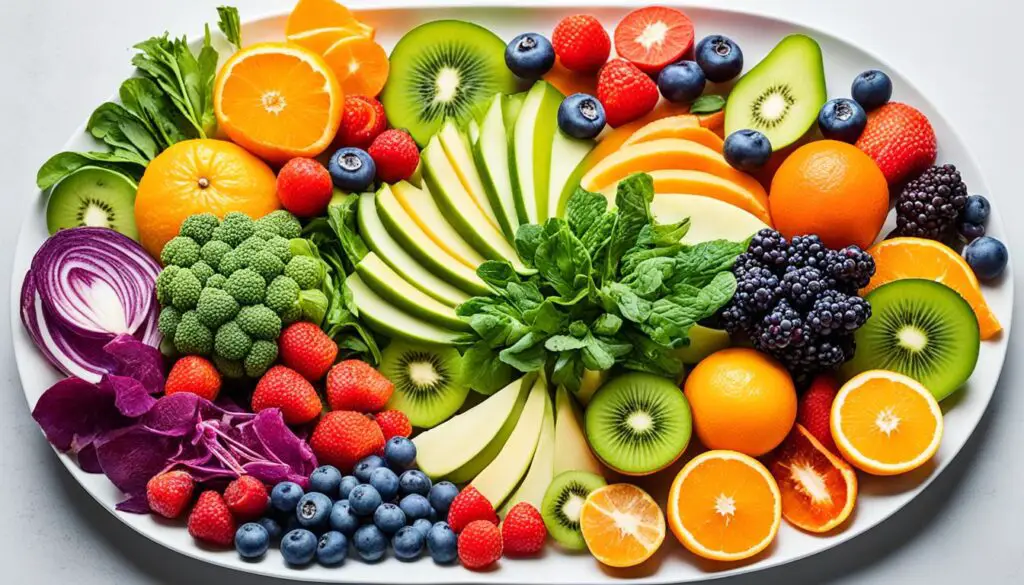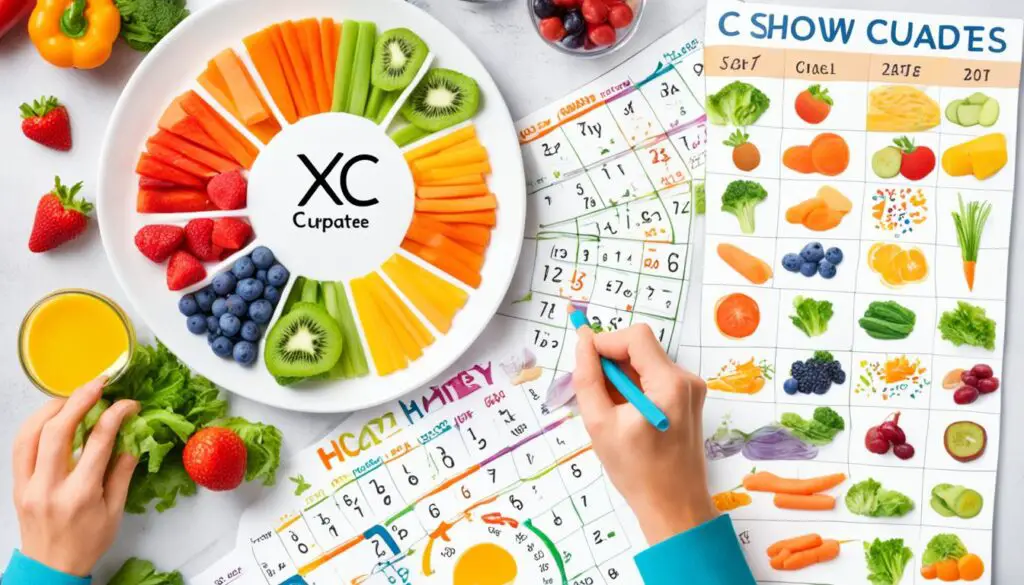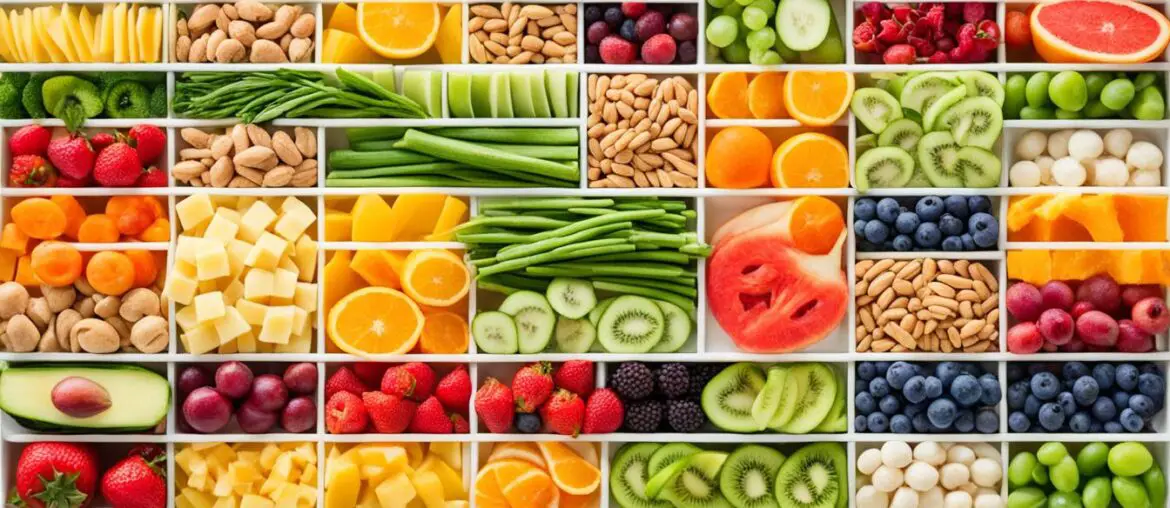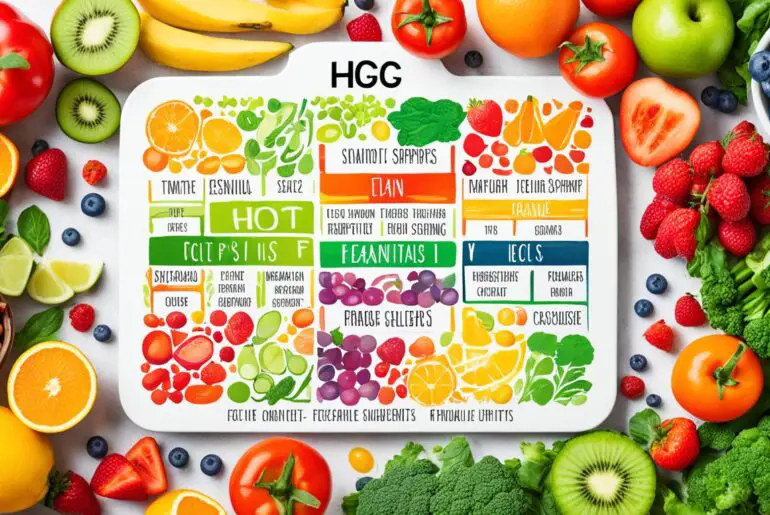Did you know that the HCG diet, a controversial weight loss plan, combines extreme calorie restriction with illegal HCG supplements or hormone injections? The US Food and Drug Administration (FDA) has only approved HCG drugs for the treatment of female infertility and strongly warns against the use of HCG supplements for weight loss. However, despite the controversy, many individuals still follow the HCG diet in hopes of shedding pounds rapidly.
Key Takeaways:
- The HCG diet is a controversial weight loss plan that combines extreme calorie restriction with HCG supplements or hormone injections.
- The FDA has only approved HCG drugs for the treatment of female infertility and advises against using HCG for weight loss.
- Despite the controversy, many individuals still follow the HCG diet.
Understanding the HCG Diet and its Controversy
The HCG diet is a weight loss regimen that involves the use of manufactured HCG supplements or hormone injections along with extreme calorie restriction. HCG, also known as human chorionic gonadotropin, is a hormone produced during pregnancy. It is believed to aid in weight loss by suppressing appetite and promoting the breakdown of stored fat.
However, it is important to note that the U.S. Food and Drug Administration (FDA) has issued a warning about the safety and effectiveness of HCG for weight loss. According to the FDA, there is no substantial evidence supporting the use of HCG supplements or hormone injections for weight loss.
“There is no evidence that HCG is effective in promoting weight loss. Any weight loss observed while on the HCG diet is likely due to the extremely low-calorie diet.” – FDA warning
Despite the lack of scientific evidence, the HCG diet has gained popularity and continues to be followed by some individuals. It is important to approach the diet with caution and consult with a healthcare professional before considering its use.
This section will provide an overview of the controversial HCG diet, shedding light on its potential risks and limited evidence base.
HCG Diet and Weight Loss
The HCG diet is primarily known for its extreme calorie restriction. The diet typically limits daily calorie intake to 500-800 calories, which is significantly lower than the average caloric requirement for most individuals. The rationale behind the diet is that the combination of HCG supplements or injections and low-calorie intake will lead to rapid weight loss.
Proponents of the HCG diet claim that it can result in quick and significant weight loss, especially in stubborn areas such as the abdomen, hips, and thighs. However, it is important to note that any weight loss observed while on the HCG diet is likely attributable to the low-calorie intake rather than the HCG supplementation itself.
HCG supplements or hormone injections are not approved by the FDA for weight loss purposes. The FDA has approved HCG drugs for the treatment of female infertility but warns against the use of HCG supplements or injections for weight loss.
The Controversy Surrounding HCG Diet
The HCG diet has sparked significant controversy among healthcare professionals and experts in the field of nutrition. Critics argue that the diet’s extreme calorie restriction is unsustainable and can lead to nutritional deficiencies and metabolic imbalances.
Furthermore, the scientific evidence supporting the efficacy and safety of the HCG diet is limited. Many studies have found that any weight loss experienced while on the diet is primarily due to the low-calorie intake rather than the HCG supplementation. The HCG hormone itself is not known to have a direct impact on weight loss.
Given the lack of substantial evidence and the FDA’s warning against the use of HCG supplements or injections for weight loss, it is essential to approach the HCG diet with caution and consider other evidence-based weight loss strategies.
The Three Phases of the HCG Diet

The HCG diet is structured into three distinct phases – the loading phase, the weight loss phase, and the maintenance phase. Each phase serves a specific purpose in the overall diet plan, ensuring optimal results and long-term success.
Loading Phase
The loading phase is the first phase of the HCG diet. During this phase, individuals consume high-fat, high-calorie foods for a period of two to three days while starting their HCG supplementation. The purpose of this phase is to saturate the body with excess calories and fats, which will be utilized during the subsequent weight loss phase.
This phase allows the body to adjust to the upcoming changes and helps jumpstart the fat-burning process. It is important to remember that this is not a license to indulge in unhealthy foods, but rather a strategic approach to prepare the body for the calorie-restricted phase to follow.
Weight Loss Phase
The weight loss phase is the most challenging phase of the HCG diet but offers the highest potential for significant weight loss. During this phase, individuals follow a very low-calorie diet, typically consisting of 500 to 800 calories per day, while continuing their HCG supplementation.
This phase typically lasts for three to six weeks, depending on individual goals and progress. The combination of the calorie-restricted diet and HCG hormone helps suppress hunger, increase fat metabolism, and maintain muscle mass. It is crucial to strictly adhere to the approved food list and portion sizes during this phase to maximize the effectiveness of the diet plan.
Maintenance Phase
The maintenance phase is the final phase of the HCG diet and focuses on stabilizing the weight loss achieved during the previous phases. During this phase, individuals gradually increase their calorie intake and discontinue HCG supplementation.
The maintenance phase typically lasts for three weeks, allowing the body to adjust to a higher caloric intake without experiencing rapid weight regain. This phase serves as a transition period from the strict diet protocol to a more balanced and sustainable eating plan. It is essential to continue making healthy food choices and maintain an active lifestyle during this phase to maintain the achieved weight loss.
By progressing through these three phases of the HCG diet – the loading phase, the weight loss phase, and the maintenance phase – individuals can experience significant weight loss while resetting their metabolism and adopting healthier eating habits.
Approved Foods on the HCG Diet
On the HCG diet, individuals are limited to specific approved foods that promote healthy weight loss and support the body’s nutritional needs. Here is a breakdown of the approved proteins, vegetables, fruits, and seasonings that can be included in your HCG diet plan:
Approved Proteins
- Chicken
- Egg Whites
- White Fish
- Crab
- Lobster
- Extra-Lean Beef
- Bison
Approved Vegetables
- Spinach
- Chard
- Cabbage
- Lettuce
- Celery
- Cauliflower
- Broccoli
- Asparagus
- And more…
Approved Fruits
- Berries
- Citrus Fruits
- Apples
These approved foods provide essential nutrients, fiber, and antioxidants while keeping calorie intake in check. They allow you to enjoy a variety of flavors and textures while ensuring compliance with the HCG diet protocol.
In addition to the approved foods listed above, you can also use certain seasonings and condiments to enhance the taste of your meals. However, it’s important to choose options that are low in sugar, calories, and additives. Always read the labels and check for any ingredients that may hinder your progress on the HCG diet.
Staying within the guidelines of the HCG diet can help you achieve your weight loss goals effectively. Remember to consult with a healthcare professional or a registered dietitian before starting any new diet plan to ensure it aligns with your individual health needs.
Restrictions on the HCG Diet

When following the HCG diet, it’s important to adhere to certain food restrictions to achieve the desired results. The diet eliminates specific food groups to promote weight loss and optimize the effects of the HCG supplements or injections. Here are the main restrictions to keep in mind:
Dairy Restrictions
Dairy products, including cheese, yogurt, and ice cream, are not allowed on the HCG diet.
Eating dairy products is restricted during the HCG diet due to their high-fat content. The diet emphasizes the consumption of lean proteins and low-calorie foods, and dairy products can hinder weight loss progress.
Carbohydrate Restrictions
Carbohydrates such as bread, pasta, and high-carb foods are also prohibited on the HCG diet.
The HCG diet restricts carbohydrate intake to enhance fat burning and prevent blood sugar spikes. By avoiding high-carb foods, the body is forced to tap into its stored fat reserves for energy, facilitating weight loss.
Fat Restrictions
Fats and oils, including salad dressings, are not permitted on the HCG diet.
The HCG diet restricts the consumption of fats and oils to promote a low-calorie intake and optimal fat burning. By eliminating added fats and oils, the body is encouraged to utilize its own fat stores for fuel, aiding in weight loss.
In addition to these specific restrictions, the HCG diet also avoids sugary foods, desserts, and sweetened beverages. These items are high in calories and can hinder weight loss progress. It’s important to focus on consuming lean proteins, approved vegetables, and fruits while on the HCG diet, following the guidelines provided by your healthcare provider or registered dietitian.
Sample HCG Diet Meal Plan
When following the HCG diet, it is essential to have a well-structured meal plan that adheres to the recommended calorie intake. The diet typically consists of two meals per day, with calories divided between lunch and dinner. There are two popular calorie options: the 500 calorie diet and the 800 calorie diet.
500 Calorie Diet Sample Meal Plan
| Meal | Food | Calories |
|---|---|---|
| Lunch | Grilled chicken breast | 110 |
| Steamed asparagus | 20 | |
| Strawberries | 40 | |
| Dinner | White fish fillet | 100 |
| Cabbage salad with lemon vinaigrette | 30 | |
| Apple | 80 |
800 Calorie Diet Sample Meal Plan
| Meal | Food | Calories |
|---|---|---|
| Lunch | Grilled chicken breast | 200 |
| Steamed asparagus | 40 | |
| Strawberries | 60 | |
| Dinner | White fish fillet | 140 |
| Cabbage salad with lemon vinaigrette | 40 | |
| Apple | 120 |
Each meal includes lean proteins, such as grilled chicken breast or white fish fillet, which are low in calories and high in essential nutrients. Approved vegetables, like steamed asparagus and cabbage salad, provide fiber and vitamins. A limited selection of fruits, such as strawberries and apples, offer natural sweetness while contributing to overall calorie intake.
It’s important to note that portion control is a key principle of the HCG diet. By carefully measuring and weighing ingredients, individuals can accurately track their calorie intake and ensure they remain within the prescribed limits. The diet also emphasizes specific food combinations to optimize nutrient absorption and support weight loss goals.
“Following a structured meal plan is essential for success on the HCG diet. By carefully selecting approved foods and controlling portion sizes, individuals can achieve their weight loss goals while maintaining proper nutrition.”
Conclusion
The HCG diet is a highly controversial weight loss plan that has gained popularity in recent years. However, it is important to approach this diet with caution. While some individuals may experience rapid weight loss on the HCG diet, health experts strongly advise against its use due to safety concerns and lack of evidence.
One of the main concerns with the HCG diet is the use of hormone supplementation. Although HCG is FDA-approved for the treatment of female infertility, there is no substantial evidence supporting its effectiveness for weight loss. Additionally, extreme calorie restriction can be detrimental to overall health and can lead to nutrient deficiencies.
Before starting any new diet plan, it is crucial to consult with a healthcare provider or registered dietitian. They can provide personalized recommendations based on your specific needs and goals. Remember, there are plenty of other safe and effective weight loss methods available that do not require extreme calorie restriction or hormone supplementation.
When it comes to your health, it is always best to prioritize safety and evidence-based practices. Instead of relying on fad diets like the HCG diet, focus on adopting a balanced and sustainable approach to weight loss that includes regular physical activity, a varied and nutritious diet, and a mindset geared towards long-term success.
FAQ
What is the HCG diet?
The HCG diet is a controversial weight loss plan that combines illegal HCG supplements or hormone injections with a low-calorie diet. The FDA has only approved HCG drugs for the treatment of female infertility and warns against the use of HCG supplements for weight loss.
What are the three phases of the HCG diet?
The HCG diet consists of three phases – the loading phase, the weight loss phase, and the maintenance phase. During the loading phase, individuals consume high-fat, high-calorie foods while starting HCG supplements. The weight loss phase involves a very low-calorie diet and ongoing HCG supplementation. The maintenance phase gradually reintroduces calories and discontinues HCG supplementation.
What foods are approved on the HCG diet?
Approved proteins include chicken, egg whites, white fish, crab, lobster, extra-lean beef, and bison. Approved vegetables include spinach, chard, cabbage, lettuce, celery, cauliflower, broccoli, asparagus, and more. Approved fruits include berries, citrus fruits, and apples. Certain seasonings and beverages are also allowed.
What foods are restricted on the HCG diet?
The HCG diet restricts certain foods and food groups. Dairy products, including cheese, yogurt, and ice cream, are not allowed. Carbohydrates such as bread, pasta, and high-carb foods are also prohibited. Fats and oils, including salad dressings, are not permitted. The diet also avoids sugary foods, desserts, and sweetened beverages.
What is a sample HCG diet meal plan?
The HCG diet recommends a meal plan consisting of two meals per day, with calories divided between lunch and dinner. The 500-calorie version of the diet is the most well-known, but there is also an alternate 800-calorie plan. Examples of meals include lean proteins, approved vegetables, and a limited selection of fruits. The diet emphasizes portion control and specific food combinations.
Is the HCG diet safe and effective?
The HCG diet is a highly controversial weight loss plan that combines hormone supplementation with extreme calorie restriction. While some individuals may experience rapid weight loss on the diet, health experts caution against its use due to safety concerns and lack of evidence. It is important to consult with a healthcare provider or registered dietitian before starting any new diet plan.




